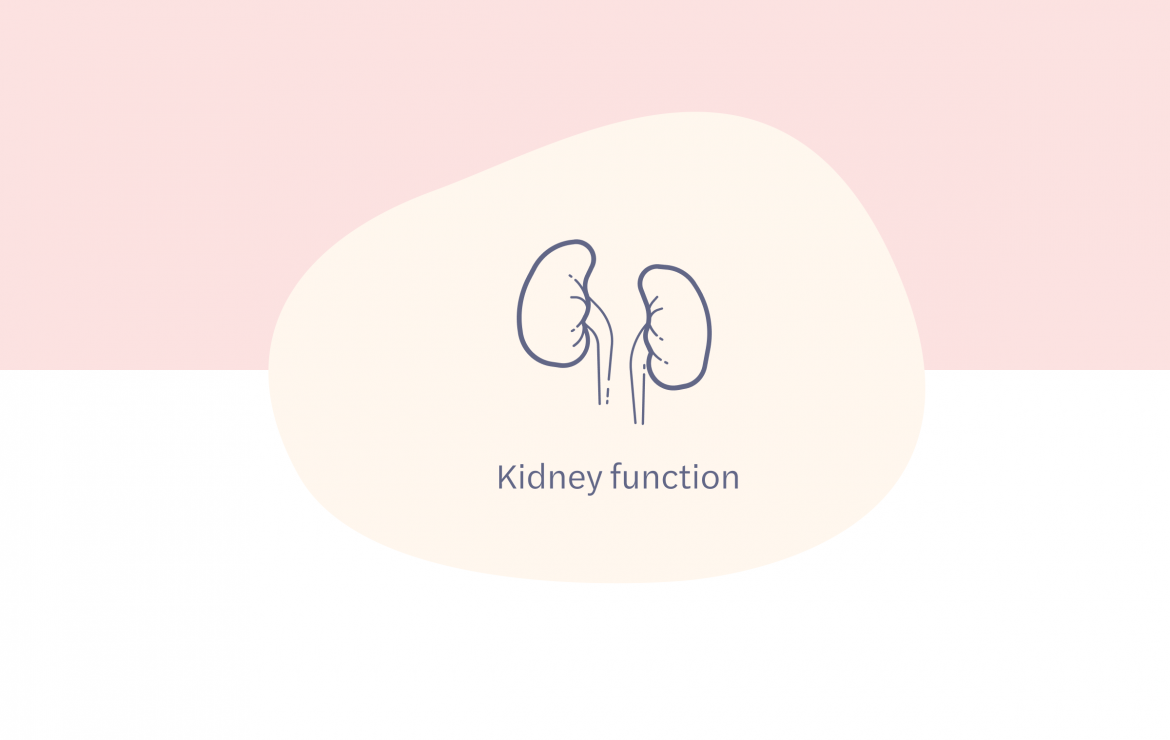Glomerular Filtration (GFR)

Kidney function
What is the Estimated Glomerular Filtration Rate (eGFR)?
Estimated Glomerular Filtration Rate (eGFR) is a measure of kidney function calculated from your blood creatinine value, also taking into account your age and sex. Glomeruli are tiny filters located in the kidney that allow waste products to be removed from the blood, while preventing the loss of useful substances such as proteins and blood cells.
Our two kidneys together filter about 200 liters of blood each day and produce about 2 liters of urine. Glomerular filtration rate (GFR) refers to the amount of blood that passes through the glomeruli per minute adjusted to the body surface area. A low GFR means decreased kidney function and that waste products cannot be effectively removed from our body.
However, measuring GFR directly is complicated. Therefore the estimated GFR value, shortened eGFR is more commonly used in the clinic. eGFR is indirectly calculated from your blood creatinine value, which is far easier to measure.
Why is this analysis important?
eGFR is calculated to assess kidney function, i.e. how efficiently our kidneys remove waste from your body. Blood creatinine alone is a rather crude marker for kidney function, calculating eGFR from blood creatinine value increases the accuracy of the test and enables early detection of kidney function loss.
Many medications that we take are eliminated from the body by our kidneys, low kidney function can mean that the medication accumulates in the body, reaching toxic concentrations. Knowing you eGFR makes it possible to adjust the dosage of the medication according to your kidney function, and thereby avoiding unnecessary side effects.
In short, it is useful to calculate eGFR levels in the blood to:
-
Assess kidney function
-
Monitor the progression of kidney disease
-
Determine the dosage of certain medications
Results
There are many different validated equations that can be used for the calculation of eGFR. Depending on the exact equation used, the obtained eGFR value may vary slightly. Different laboratories can also use different methods to measure blood creatinine, which will also affect the eGFR value calculated.
The eGFR value decreases naturally with increased age. The normal ranges for eGFR are therefore different depending on the age group. Doctors can also need to take into account your height and weight and other kidney function markers when evaluating your eGFR value.
High eGFR values are usually normal and do not need to be a cause of concern.
Low eGFR values may be associated with:
-
Chronic and acute kidney disease
-
Dehydration
-
Drug toxicity
Other Considerations
eGFR calculations can be inaccurate in people that are extremely malnourished or morbidly obese. Some racial groups may fit the equations used for eGFR calculations less well.
It is often more informative to look at trends in eGFR than just one-off reading. Rapidly declining eGFR values are often more alarming than a low eGFR value that remains stable over time.
Since eGFR is calculated from blood creatinine, the value is also affected by all the factors that can affect blood creatinine measurement. It is common to evaluate eGFR values together with other markers of kidney function such as Urea and Cystatin C.
Tests that include this marker
References
Assessment of kidney function. Lesley A Inker, MD, MS. UpToDate Jun 12, 2018









